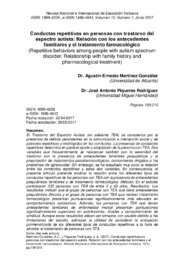Por favor, use este identificador para citar o enlazar este ítem:
https://hdl.handle.net/11000/35985Registro completo de metadatos
| Campo DC | Valor | Lengua/Idioma |
|---|---|---|
| dc.contributor.author | MARTINEZ-GONZALEZ, AGUSTIN ERNESTO | - |
| dc.contributor.author | Piqueras, Jose A | - |
| dc.contributor.other | Departamentos de la UMH::Psicología de la Salud | es_ES |
| dc.date.accessioned | 2025-03-14T11:51:06Z | - |
| dc.date.available | 2025-03-14T11:51:06Z | - |
| dc.date.created | 2017-06 | - |
| dc.identifier.citation | Revista de Educación Inclusiva. 2017, 10(1): 199-210 | es_ES |
| dc.identifier.issn | 1989-4643 | - |
| dc.identifier.issn | 1889-4208 | - |
| dc.identifier.uri | https://hdl.handle.net/11000/35985 | - |
| dc.description.abstract | El Trastorno del Espectro Autista (en adelante TEA) se caracteriza por la presencia de déficits persistentes en la comunicación e interacción social y de patrones repetitivos y restringidos en las conductas. La presencia de conductas repetitivas determina en parte el ajuste o adaptación de la persona con TEA. Dos variables que frecuentemente se relacionan también con la severidad del trastorno son la presencia de antecedentes familiares psiquiátricos y la prescripción de tratamientos psicofarmacológicos, comúnmente dirigidos a los problemas de agresividad. Sin embargo, se ha estudiado muy poco la relación entre las conductas repetitivas y estas dos variables. En consecuencia, el presente artículo pretende analizar la relación entre los diferentes tipos de conductas repetitivas de las personas con TEA con la presencia de antecedentes psiquiátricos familiares y de tratamiento farmacológico. Método: En el estudio participaron 233 personas con TEA de entre 3 y 63 años. Resultados: Los resultados indican que el grupo de personas con TEA que tiene antecedentes psiquiátricos directos y el grupo de personas con TEA que reciben tratamiento farmacológico presentan puntuaciones significativamente más elevadas en comportamientos autolesivos. Además, las personas con TEA que tienen antecedentes familiares de enfermedad mental presentan puntuaciones significativamente superiores en autolesiones, rituales y comportamiento de similitud. Aunque estos resultados deben ser tomados con cautela debido a las limitaciones del estudio, subrayan la utilidad de considerar la evaluación pormenorizada de los diferentes tipos de conductas repetitivas a la hora de abordar el tratamiento de personas con TEA. | es_ES |
| dc.description.abstract | Autism Spectrum Disorder (hereinafter ASD) is characterized by the presence of persistent deficits in social communication and interaction and of restricted and repetitive patterns of behavior. The new DSM-5 pays special attention to the level of severity. Therefore, there is a need for the use of diagnostic assessment tools that measure the severity of symptoms. The presence of repetitive behaviors in part determines the person with ASD’s adaptation. Two variables that often also are related to disorder severity are the presence of a psychiatric familiar history and the prescription of psychopharmacological treatments commonly directed at the aggressiveness problems. However, has been little studied the relationship between these two variables and repetitive behaviors. As a result, this article aims to analyse the relationship between the different types of repetitive behaviors of persons with ASD in the presence of family psychiatric history and pharmacological treatment. Method: The study included 233 subjects with ASD between 3 and 63 years. Results: The results indicate that the group of people with ASD who have a family psychiatric history and the group of people with ASD who is receiving pharmacological treatment have significantly higher scores on stereotyped behaviors and self-injury. Although these results should be taken with caution due to the limitations of the study, they underline the usefulness of considering the detailed evaluation of the different types of repetitive behaviors in dealing with treatment of people with ASD | es_ES |
| dc.format | application/pdf | es_ES |
| dc.format.extent | 12 | es_ES |
| dc.language.iso | spa | es_ES |
| dc.publisher | Editorial Enfoques Educativos | es_ES |
| dc.rights | info:eu-repo/semantics/openAccess | es_ES |
| dc.rights | Attribution-NonCommercial-NoDerivatives 4.0 Internacional | * |
| dc.rights.uri | http://creativecommons.org/licenses/by-nc-nd/4.0/ | * |
| dc.subject | conducta repetitiva | es_ES |
| dc.subject | trastorno del espectro autista | es_ES |
| dc.subject | historia familiar psiquiátrica | es_ES |
| dc.subject | farmacología | es_ES |
| dc.subject | repetitive behavior | es_ES |
| dc.subject | autism spectrum disorder | es_ES |
| dc.subject | psychiatric family history | es_ES |
| dc.subject | pharmacology | es_ES |
| dc.subject.other | CDU::1 - Filosofía y psicología::159.9 - Psicología | es_ES |
| dc.title | Conductas repetitivas en personas con trastorno del espectro autista: Relación con los antecedentes familiares y el tratamiento farmacológico | es_ES |
| dc.title.alternative | Repetitive behaviors among people with autism spectrum disorder: Relationship with family history and pharmacological treatment | es_ES |
| dc.type | info:eu-repo/semantics/article | es_ES |

Ver/Abrir:
2017_70_Investigacion_Publicaciones_Conductas repetitivas en personas.pdf
497,28 kB
Adobe PDF
Compartir:
 La licencia se describe como: Atribución-NonComercial-NoDerivada 4.0 Internacional.
La licencia se describe como: Atribución-NonComercial-NoDerivada 4.0 Internacional.
.png)